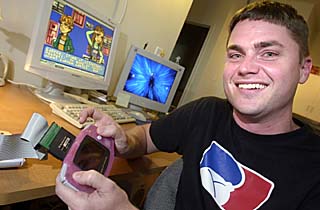Game Boy
Eric Kinkead holds fast to his old-school roots in a new millennium
By Michael Connor, Fri., July 19, 2002

When Eric Kinkead got his start as a video game programmer, the cartridge was king and a joystick was still just a joystick. A was "run," B was "shoot," and no further instructions were necessary. A group of overcaffeinated MIT undergrads could hack a new version of Mr. Do in a night or two of greasy Chinese food and fast-and-loose programming, and everyone still thought Tron had pretty neat special effects.
As a teenager, Kinkead lived for video games. He worked on his first professional project, an Atari title called Elf Lord's Magic, when he was just 17. "I come from the Eighties, where it was games like Robotron, Defender, Stargate," Kinkead explains. "That was what it was all about. My life was really focused around those games."
Since then, a lot has changed. Video gaming is now a $9.5 billion industry, growing faster than the movie business. Old 2-D friends like Donkey Kong and Mario have entered the third dimension. Controllers have more buttons than people have fingers. And a single title might take two years and millions of dollars to develop.
Times have changed, but Eric Kinkead still lives for video games. He has his own Austin-based video game company, Game Titan, and he's gained a foothold in an inhospitable market by hanging on to his old-school roots. The company, which now boasts an in-house staff of five people, has developed titles for the Game Boy like Frogger 2 and Nascar Heat. A new game, Spy Kids: Challenger, was approved by Nintendo on June 25 and is now in manufacturing.
Game Titan was founded with a vision, and the vision didn't look like Kinkead's last job. He doesn't have fond memories of the corporate world: "All the ceilings were just lit up with this crazy fluorescent brightness from hell, and everyone would glow with this fluorescent glow. There was nothing but just cubicle after cubicle after cubicle of people calling manufacturers, and people calling distributors, and people calling about hardware, and it was really sterile."
In contrast, it's always casual Friday at Kinkead's company. Housed in a condo on East Third Street, only a Game Titan sticker on the door differentiates it from its residential neighbors. The fridge is stocked with soft drinks, employees play Resident Evil on a Nintendo GameCube during coffee breaks, and two Chihuahuas fight for the world featherweight title at ankle level.
Despite this laissez-faire attitude toward professional appearances, Game Titan is no fly-by-night venture-capital-funded new economy operation. Kinkead built the business from the ground up. It all started three years ago with a computer and a severance check in the living room of Kinkead's apartment. "I didn't have a car, I didn't have any stuff," he recalls. "I just holed up in an apartment for about a year, making my own video games."
At the time, Kinkead was part of an underground online community of unpublished video game programmers who write unlicensed games for Nintendo's hand-held GameBoy system. They swap games and hold competitions to recognize the best independent game developers in the world. Kinkead started working with another programmer in this scene named Mikael Andersson, who was reigning champ in the underground programming scene at the time. Communicating through e-mail and IM, the two worked day and night developing demo games for the GameBoy.
The GameBoy system attracts up-and-coming independent game designers like Kinkead and Andersson because its development process is much less labor-intensive than that of console video game systems. It uses two-dimensional graphics instead of three-dimensional, and it uses cartridges instead of the higher capacity CDs. Translation: These games look and feel like the games Kinkead lived for back in high school. This is the Super-8 film of the video game world. You can see how someone who cut his teeth on Robotron might find his niche here.
Even with the relative simplicity of the GameBoy, it's no simple matter to go into business as a video game developer. You can't just write a Nintendo game, put some copies in Ziploc bags and take out an ad in the back of Popular Science. Game development requires special hardware, and the only way to get the hardware is from Papa Nintendo himself. "When you're dealing with Nintendo, it's a sordid, sordid mess," says Kinkead. "What they do is patent all their hardware to the point where if you want to make anything on a Nintendo system, you have to be a licensed developer."
Early on, Andersson and Kinkead weren't licensed developers. They were the video game equivalent of unpublished writers, using bootleg Korean hardware to create games that could not be sold legally. "We just cracked at it, we just hit it every night," says Kinkead. "Then I would knock on doors of publishers and get denied, and knock on doors of publishers and get denied."
After accruing enough rejection slips to make an out-of-work English teacher proud, they finally found a publisher, Majesco, that liked their work. The publisher asked them to make a version of a game called Rainbow 6 for the Sega Dreamcast. Game Titan was in business.
In spite of Kinkead's affinity for the old-school feel of the GameBoy, Game Titan plans to move away from the hand-held and into console game development sometime in the next year. With the support of Epic MegaGames (a larger game developer) they're gearing up to make a 3-D version of a game called Jazz Jackrabbit.
The difficulty of moving graphics from the good ol' x and y into the z axis is hard to overstate. Whereas a GameBoy title like Spy Kids uses between 40 and 50 sound effects and six or seven songs, a typical console game includes about 5,000 sound files and 100 music files.
This increased complexity makes gaming on a console system, such as the Nintendo GameCube, a new kind of experience. While the two-dimensional games of yesteryear were sometimes violent -- Kinkead claims that Missile Command is the most violent video game of all time -- the violence was abstract; the annihilation of an entire city might have been represented by an abstract geometric shape. Around the time of Mortal Kombat, graphics improved, and violence in video games got up close and personal. In the new 3-D games, you kill a zombie, you hear its skull crack, and you see its guts cascade out of its stomach. Instead of the abstract idea of violence and a body count numbering millions of innocent civilians, we now have an outraged moral majority, a few dead zombies, and an experience that simulates real-life violence much more faithfully. It's a whole new ball of wax.
But Kinkead is not afraid of change. He's seen the industry evolve over time, and he's evolved with it. He was with Midway when that company released Mortal Kombat, which brought the wrath of America's moral guardians down on the video game industry. "I remember hanging out in Ed Boon's office and they were talking about being on Oprah, and I said, 'Yeah, you should go on Oprah, you should go on Oprah.' The president of the company walks into the room and shut the door behind him and was like, 'No one's going on Oprah, goddammit.' And he sat down and talked about the fiasco, with the Senate hearings that were coming to 'em," remembers Kinkead. "That was fun, seeing that whole hype."
It was fun for Kinkead because he didn't have to sit in the Senate-hearing hot seat. Now that he's running his own company, it's a different story. So far, Game Titan has steered clear of zombies and disembowelings, and Kinkead & Co. should be safe from the wrath of Arlen Specter for the foreseeable future -- unless, of course, Jazz Jackrabbit turns out to be unexpectedly rascally. ![]()










